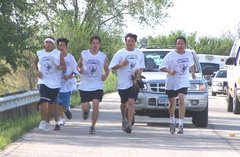Aug 17, 2005 10:03 pm US/Central
New Suicide Hot Line For Native American Youth
(AP) Minneapolis Monica Yellow Bird was only 17 when her cousin hung himself. Her cousin, also 17, had plans for the future, she said. He was ambitious and he worked out. But he was drinking at the time, and when her family returned to her grandmother's home one day they found him hanging by a sheet inside. "As native people, we keep everything inside. We think it makes us stronger," said Yellow Bird, now 23. "But people need to talk about youth suicide in our community." And that's exactly what many American Indian community leaders are trying to do. On Wednesday, Yellow Bird gathered with American Indian teens and community leaders to kick off the Honor the Youth Spiritual Run and introduce the Native Youth Crisis Hotline. American Indians from 15 to 24 in Minnesota are more than twice as likely to commit suicide than teens of other racial or ethnic groups. "It's so common, it happens all the time," said Yellow Bird. "Everybody in the community has similar stories." The run was to kick off at midnight Wednesday, winding almost 300 miles through the state and ending on northern Minnesota's Red Lake Reservation. In March, 16-year-old Jeff Weise killed nine people -- including seven at Red Lake High School -- before turning the gun on himself and leaving a traumatized reservation in his wake. "(The run and the hot line) are the first of a lot of things in our community that we need to do to heal," said Minneapolis School Board member Peggy Flanagan, a member of Minnesota's White Earth tribe and the first American Indian to serve on the school board. Although many in the American Indian community are hesitant to point to the Red Lake trauma as a reason for increased suicide prevention efforts, they certainly see it as a reminder of the possible consequences if problems are not addressed. Community members say isolation, alcohol, drugs, violence and family problems are some of the problems that spur the high suicide rates. "Our kids are facing incredible odds," said Flanagan. "We should all be out there lifting them up." Nationwide, American Indians between the ages of 15 and 24 are three times more likely to commit suicide than any other racial or ethnic group. Suicide is the second-leading cause of death for American Indians from 15 to 34. Remembering her own brother's suicide helped spur Pat Shepard, a Minneapolis social worker and member of Wisconsin's Lac du Flambeau tribe, to propose the hot line. Shepard said she was researching American Indian youth suicide rates for a presentation when the shootings at Red Lake were splattered all over the national news. Memories of her brother haunted her, and the statistics seemed to keep piling up. "(Organizing the hot line) was a very intense experience for me. I knew something had to be done," said Shepard. So she started working -- almost $40,000 has been spent developing the hot line -- and two months later, it is operating. It is being run and staffed by Women of Nations, a group that supports battered women and their families and already runs its own hot line. More than 30 Minnesota agencies and community groups have supported the hot line, which will cost an estimated $280,000 a year. The National Congress of American Indians is interested in holding it up as a national model, organizers say. The 24-hour hot line is expecting to receive most of its calls from 12- and 13-year-olds, but it plans to serve people up to 18, said Ann Gaasch, a suicide prevention coordinator with the Minnesota Department of Health. Organizers are starting to distribute business cards with the hot line phone number all over the state. Word of mouth is a strong advertiser in the American Indian community, she said, and the hot line's success will depend on that. Cards will also be handed out during the Honor the Youth Spiritual Run, where participants will carry a staff adorned with eagle feathers through American Indian communities statewide. Many prominent community members will participate, including Floyd Jourdain Jr., the Red Lake tribal chairman. "We're losing children very quick, very fast," said Shepard. "If those kids had a number to call, maybe that could prevent it." -----------------------------------------------------------------------------------------Native Youth Crisis Hotline: 1-877-209-1266.
(© 2005 The Associated Press. All Rights Reserved. This material may not be published, broadcast, rewritten, or redistributed.)
Friday, March 2, 2007
Subscribe to:
Post Comments (Atom)

No comments:
Post a Comment